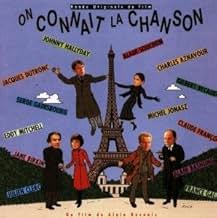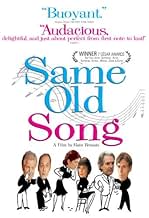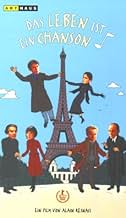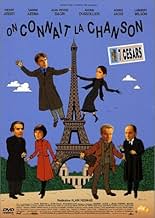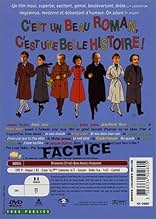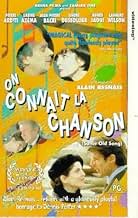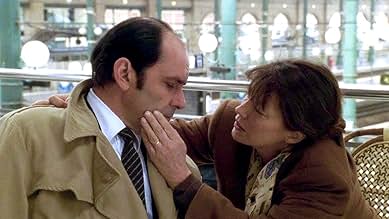VALUTAZIONE IMDb
7,3/10
4535
LA TUA VALUTAZIONE
Una storia musicale su come le persone trovano il loro amore per le strade della bellissima Parigi.Una storia musicale su come le persone trovano il loro amore per le strade della bellissima Parigi.Una storia musicale su come le persone trovano il loro amore per le strade della bellissima Parigi.
- Premi
- 10 vittorie e 9 candidature totali
Trama
Lo sapevi?
- QuizThe film is dedicated to the memory of Dennis Potter, and is in the style of Potter's lip-sync musicals like Pennies from Heaven (1978), The Singing Detective (1986) and Lipstick on Your Collar (1993).
- ConnessioniFeatured in 6 à la maison: Episodio datato 27 gennaio 2021 (2021)
- Colonne sonoreJ'ai Deux Amours
Music by Vincent Scotto
Lyrics by Georges Koger and Henri Varna
Performed by Josephine Baker
Recensione in evidenza
Reminiscent of Jacques Demy's 1968 "The Young Girls of Rochefort" where characters now and then burst into song (and dance) to convey the story, and Eric Rohmer's flavor of intertwined relationships and coincidental meetings of characters that wrap around a tale, Alain Resnais' treatment here in 1997 "Same Old Song" has his characters burst into lines of songs in between dialogs. Irrespective of the mix and match of a male vocal coming out of a female character or vice versa, they are excerpted strains and words chosen from certain songs that propel the storytelling. It's as if the characters are thinking aloud in songs on the situation or predicament at hand. It is rather fun once you get a sense of what Resnais was trying to deliver. Being an Alain Resnais film, intellectual exchanges and philosophical tones are never lacking.
Definitely reminded me of his treatment on 1980 "Mon oncle d'Amerique" where he has scientific mice experiment scenes juxtaposed against the human (brain) reactions to relationships and love. In this 1997 "On connait la chanson", his fascination with how people think - how the brain cells work in each of the characters, is again deftly demonstrated. At the last segment, where a theoretical explosion of the minds occur as gray matters collide - there was an appearance of a graphical ear-shape (in quiet wavy motion) in the center of it all - it's amazing to see how Resnais' mind at 75 was still so very much into studying and unraveling human emotions, offering us life lessons in love.
The story centers around two sisters, Camille the tour guide who's also writing a thesis (Agnes Jaoui) and her popular and successful sibling Odile (Sobine Azema), and four men in their lives: an old flame of Odile - Nicolas (Jean-Pierre Bacri), husband of Odile - Claude (Pierre Arditi), writer of radio plays and quiet admirer of Camille - Simon (Andre Dussollier, more casually groomed than usual), and profiteering real-estate agent of Odile, fanciful beau of Camille and arrogant boss of Simon - Marc (Lambert Wilson).
Typographically oriented, I can't help noticing the sequence of treatment to the credit roll at the end of the film: it started with a centrifugal look of the names of les chanteurs, followed by horizontal scroll from right to left of the main cast and crew, then a quick shooting upwards to facilitate the conventional bottom to top scroll of rest of the credits.
It may not be a French film for just anybody, it certainly is delightful to experience. (An Artistic License and Merchant-Ivory Films production indeed!) The subtitles, translated by Ian Burley, were super: the lyrics actually rhyme in English, e.g., "resist", "exist", "egotist"!
This film was dedicated to Dennis Potter, a cerebral genius he was. Check out his 1996 "Karaoke" (a multitude of colorfully complex characters) and "Cold Lazarus" (quite a sci-fi notion not completely implausible) - both centers around Albert Finney being the main character, and as always, a tour de force performance Finney delivered.
Definitely reminded me of his treatment on 1980 "Mon oncle d'Amerique" where he has scientific mice experiment scenes juxtaposed against the human (brain) reactions to relationships and love. In this 1997 "On connait la chanson", his fascination with how people think - how the brain cells work in each of the characters, is again deftly demonstrated. At the last segment, where a theoretical explosion of the minds occur as gray matters collide - there was an appearance of a graphical ear-shape (in quiet wavy motion) in the center of it all - it's amazing to see how Resnais' mind at 75 was still so very much into studying and unraveling human emotions, offering us life lessons in love.
The story centers around two sisters, Camille the tour guide who's also writing a thesis (Agnes Jaoui) and her popular and successful sibling Odile (Sobine Azema), and four men in their lives: an old flame of Odile - Nicolas (Jean-Pierre Bacri), husband of Odile - Claude (Pierre Arditi), writer of radio plays and quiet admirer of Camille - Simon (Andre Dussollier, more casually groomed than usual), and profiteering real-estate agent of Odile, fanciful beau of Camille and arrogant boss of Simon - Marc (Lambert Wilson).
Typographically oriented, I can't help noticing the sequence of treatment to the credit roll at the end of the film: it started with a centrifugal look of the names of les chanteurs, followed by horizontal scroll from right to left of the main cast and crew, then a quick shooting upwards to facilitate the conventional bottom to top scroll of rest of the credits.
It may not be a French film for just anybody, it certainly is delightful to experience. (An Artistic License and Merchant-Ivory Films production indeed!) The subtitles, translated by Ian Burley, were super: the lyrics actually rhyme in English, e.g., "resist", "exist", "egotist"!
This film was dedicated to Dennis Potter, a cerebral genius he was. Check out his 1996 "Karaoke" (a multitude of colorfully complex characters) and "Cold Lazarus" (quite a sci-fi notion not completely implausible) - both centers around Albert Finney being the main character, and as always, a tour de force performance Finney delivered.
I più visti
Accedi per valutare e creare un elenco di titoli salvati per ottenere consigli personalizzati
- How long is Same Old Song?Powered by Alexa
Dettagli
- Data di uscita
- Paesi di origine
- Sito ufficiale
- Lingue
- Celebre anche come
- Same Old Song
- Luoghi delle riprese
- Hôtel Meurice - 228 Rue de Rivoli, Paris 1, Parigi, Francia(opening scene: Camille tells about von Choltitz in front of the hotel)
- Aziende produttrici
- Vedi altri crediti dell’azienda su IMDbPro
Botteghino
- Budget
- 7.900.000 € (previsto)
- Tempo di esecuzione2 ore
- Colore
- Mix di suoni
- Proporzioni
- 1.85 : 1
Contribuisci a questa pagina
Suggerisci una modifica o aggiungi i contenuti mancanti

Divario superiore
By what name was Parole, parole, parole... (1997) officially released in India in English?
Rispondi
